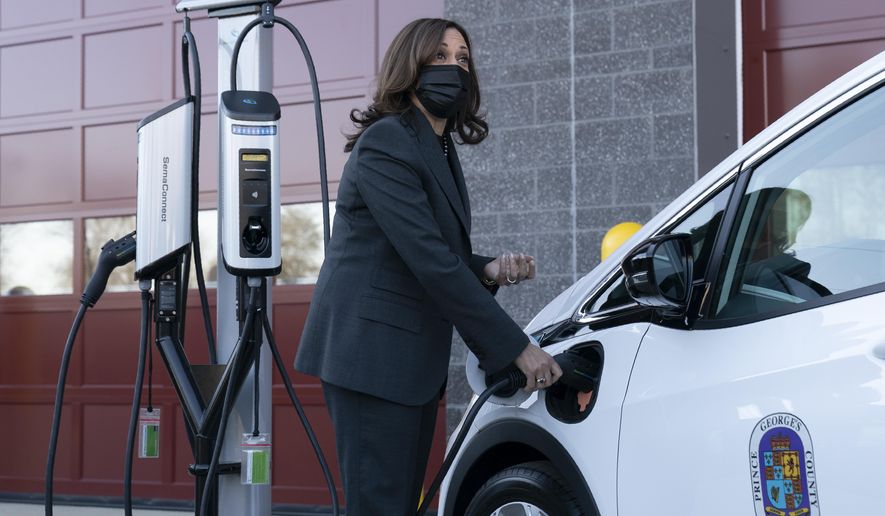Plugging in an electric car should be as easy as filling up at the gas station, Vice President Kamala Harris said Monday as she outlined White House plans to build a national network of charging stations in pursuit of President Biden’s goal of ensuring that electric cars make up half of all vehicle sales by 2030.
The action plan creates a Joint Office of Energy and Transportation between the departments of Energy and Transportation and taps into funding from the bipartisan infrastructure law that President Biden signed in November.
The measure includes $5 billion that will be disbursed to states to build charging stations from coast to coast and $2.5 billion that supports places looking to fill gaps in charging access within rural and poor communities.
The Transportation Department will issue guidance to states in early 2022 on how to deploy charging stations to ensure they work and are placed where they are needed.
“Absolutely make it accessible for everyone. And easy — just like filling up your car with gas,” Ms. Harris said during a tour of a maintenance facility in Brandywine, Maryland, where she got a glimpse of Prince George’s County’s efforts to electrify its entire fleet of vehicles by 2035.
She said the rollout would be modeled on lessons the government learned from expanding access to broadband internet.
“When we think about the rollout of electric vehicles, we have those lessons in mind,” the vice president said. “Parity and equity and … thinking about communities that usually get overlooked.”
Energy Secretary Jennifer Granholm, National Climate Adviser Gina McCarthy and Democratic Sens. Ben Cardin and Chris Van Hollen of Maryland joined Ms. Harris, who delivered remarks between a silver Ford F-150 and a red Chevrolet Volt. She also plugged in one of the cars.
“There’s no sound or fume,” she said, adding with a laugh: “How do I know it’s actually working?”
A briefer said the charging station would start blinking green when it is done.
Mr. Biden announced his 2030 goal in August, saying the U.S. had to keep pace with electric-car use and manufacturing elsewhere and combat climate change.
The ambitious plan requires batteries, however. The White House this year cheered South Korean companies that established battery plants in Georgia and Texas, saying the investments would create jobs and power the electric fleet without help from China.
The White House on Monday said it will request information from car markers on their ability to meet the administration’s goal and take additional steps to spur domestic battery production, including new access to lithium mining at the Thacker Pass in Nevada.
“The electric car future is cleaner, more equitable, more affordable, and an economic opportunity to support good-paying, union jobs across American supply chains as automakers continue investing in manufacturing clean vehicles and the batteries that power them,” according to a White House fact sheet.
Not everyone was pleased with the announcement.
Power The Future, a right-of-center advocacy group that is critical of Mr. Biden’s green agenda, said the administration has a tendency to unveil environmental plans immediately after natural disasters, this time after devastating tornadoes across Kentucky.
“This pathetic pattern from Joe Biden and his administration needs to stop because when Americans are hurting, our leaders should only focus on compassion,” communications director Larry Behrens said. “Instead, Biden and his eco-supporters believe natural disasters are the best time to press an unpopular agenda, but they need to learn [that] tragedy should never be seen as a political opportunity.”
• Tom Howell Jr. can be reached at thowell@washingtontimes.com.




Please read our comment policy before commenting.